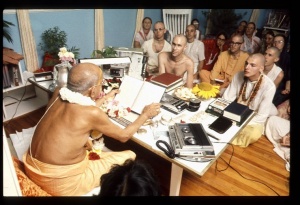CC Madhya 19.106: Difference between revisions
m (1 revision(s)) |
No edit summary |
||
| Line 1: | Line 1: | ||
{{ | [[Category:Sri Caitanya-caritamrta - Madhya-lila Chapter 19|C106]] | ||
<div style="float:left">'''[[Sri Caitanya-caritamrta|Śrī Caitanya-caritāmṛta]] - [[CC Madhya|Madhya-līlā]] - [[CC Madhya 19|Chapter 19: Lord Śrī Caitanya Mahāprabhu Instructs Śrīla Rūpa Gosvāmī]]'''</div> | |||
<div style="float:right">[[File:Go-previous.png|link=CC Madhya 19.105|Madhya-līlā 19.105]] '''[[CC Madhya 19.105|Madhya-līlā 19.105]] - [[CC Madhya 19.107|Madhya-līlā 19.107]]''' [[File:Go-next.png|link=CC Madhya 19.107|Madhya-līlā 19.107]]</div> | |||
{{CompareVersions|CC|Madhya 19.106|CC 1975|CC 1996}} | |||
{{RandomImage}} | |||
==== TEXT 106 ==== | ==== TEXT 106 ==== | ||
<div | <div class="verse"> | ||
śyāmam eva paraṁ rūpaṁ | :śyāmam eva paraṁ rūpaṁ | ||
purī madhu-purī varā | :purī madhu-purī varā | ||
vayaḥ kaiśorakaṁ dhyeyam | :vayaḥ kaiśorakaṁ dhyeyam | ||
ādya eva paro rasaḥ | :ādya eva paro rasaḥ | ||
</div> | </div> | ||
| Line 14: | Line 18: | ||
==== SYNONYMS ==== | ==== SYNONYMS ==== | ||
<div | <div class="synonyms"> | ||
''śyāmam''—the form of Śyāmasundara; ''eva''—certainly; ''param''—supreme; ''rūpam''—form; ''purī''—the place; ''madhu-purī''—Mathurā; ''varā''—best; ''vayaḥ''—the age; ''kaiśorakam''—fresh youth; ''dhyeyam''—always to be meditated on; ''ādyaḥ''—the original transcendental mellow, or conjugal love; ''eva''—certainly; ''paraḥ''—the supreme; ''rasaḥ''—mellow. | |||
</div> | </div> | ||
| Line 21: | Line 25: | ||
==== TRANSLATION ==== | ==== TRANSLATION ==== | ||
<div | <div class="translation"> | ||
“‘The form of Śyāmasundara is the supreme form, the city of Mathurā is the supreme abode, Lord Kṛṣṇa’s fresh youth should always be meditated upon, and the mellow of conjugal love is the supreme mellow.’” | “‘The form of Śyāmasundara is the supreme form, the city of Mathurā is the supreme abode, Lord Kṛṣṇa’s fresh youth should always be meditated upon, and the mellow of conjugal love is the supreme mellow.’” | ||
</div> | </div> | ||
| Line 28: | Line 32: | ||
==== PURPORT ==== | ==== PURPORT ==== | ||
<div | <div class="purport"> | ||
This verse is found in the Padyāvalī (82). | This verse is found in the ''Padyāvalī'' (82). | ||
</div> | </div> | ||
__NOTOC__ | |||
<div style="float:right; clear:both;">[[File:Go-previous.png|link=CC Madhya 19.105|Madhya-līlā 19.105]] '''[[CC Madhya 19.105|Madhya-līlā 19.105]] - [[CC Madhya 19.107|Madhya-līlā 19.107]]''' [[File:Go-next.png|link=CC Madhya 19.107|Madhya-līlā 19.107]]</div> | |||
__NOTOC__ | |||
__NOEDITSECTION__ | |||
Revision as of 14:59, 2 September 2021
Śrī Caitanya-caritāmṛta - Madhya-līlā - Chapter 19: Lord Śrī Caitanya Mahāprabhu Instructs Śrīla Rūpa Gosvāmī

His Divine Grace
A.C. Bhaktivedanta Swami Prabhupada
A.C. Bhaktivedanta Swami Prabhupada
TEXT 106
- śyāmam eva paraṁ rūpaṁ
- purī madhu-purī varā
- vayaḥ kaiśorakaṁ dhyeyam
- ādya eva paro rasaḥ
SYNONYMS
śyāmam—the form of Śyāmasundara; eva—certainly; param—supreme; rūpam—form; purī—the place; madhu-purī—Mathurā; varā—best; vayaḥ—the age; kaiśorakam—fresh youth; dhyeyam—always to be meditated on; ādyaḥ—the original transcendental mellow, or conjugal love; eva—certainly; paraḥ—the supreme; rasaḥ—mellow.
TRANSLATION
“‘The form of Śyāmasundara is the supreme form, the city of Mathurā is the supreme abode, Lord Kṛṣṇa’s fresh youth should always be meditated upon, and the mellow of conjugal love is the supreme mellow.’”
PURPORT
This verse is found in the Padyāvalī (82).